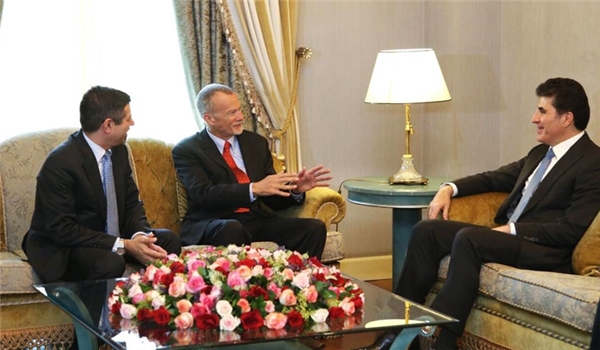US Consulate in Erbil Forefront of Attempts to Destabilize Iran's Western Borders
 TEHRAN (Defapress)- Earlier reports in May after appointment of John Bolton as the US National Security Advisor said that Washington's withdrawal from the 2015 nuclear deal is possibly the first step of a roadmap whose final goal is fomenting insecurity and instability in Iran.
TEHRAN (Defapress)- Earlier reports in May after appointment of John Bolton as the US National Security Advisor said that Washington's withdrawal from the 2015 nuclear deal is possibly the first step of a roadmap whose final goal is fomenting insecurity and instability in Iran.
Support for disintegration of Iran and destabilizing its borders is one of the strategic components of a plan which has reportedly been devised by Bolton in consultation with the Security Studies Group (SSG). The designers of the plan believe that provocation of attempts to disintegrate Iran is one of the tools that the US has ignored for years and it can now be used to pressure the Islamic Republic of Iran.
A few months after Bolton's appointment, the US media reported a meeting between members of a terrorist group active at the Western borders of Iran with the US officials in Washington.
Mustafa Hijri, the head of the Kurdistan Democratic Party of Iran (KDPI) terrorist group, visited Washington June 11-17 to discuss the situation in Iran with State Department officials, congressmen and think tank experts, according to al-Monitor.
Referring to Hijri’s visit to the US State Department on June 15, the KDPI’s official website issued a statement, saying, “Unlike previous meetings in which mostly human rights issues were discussed, the latest meetings were about some important political matters that affect Iran and the role of the KDPI.”
Al-Monitor reported earlier this month that the Donald Trump administration is moving to increase pressure on Iran from Iraqi Kurdistan by appointing an Iran expert to head the US Consulate in Erbil.
The move comes as armed Iranian Kurdish terrorist groups have intensified their attacks on Islamic Revolutionary Guard Corps (IRGC) positions in Western Iran.
Washington replaced Ken Gross, the outgoing consul general, with Steven Fagin, director of the Office of Iranian Affairs at the State Department’s Bureau of Near Eastern Affairs.
According to al-Monitor, the appointment appears to be part of Secretary of State Mike Pompeo’s effort to dent Iran’s ability to operate in the region amid the looming reimposition of US sanctions. The United States seeks to exert “unprecedented financial pressure” on Iran until it forces Tehran to make a “tangible, demonstrable and sustained shift” in policy, Pompeo said in a recent letter, co-authored with Treasury Secretary Steven Mnuchin, to the European Union.
Also, the Kurdish-affiliated Rudaw news website reported earlier this week that Nechirvan Barzani, the Kurdistan Region Government (KRG) Prime Minister, met with the outgoing US Consul General to Erbil Ken Gross and his replacement Steven Fagin last Monday.
It added that incoming counsul general Steven Fagin is an Iran specialist – an interesting choice of candidate at a time when the Trump administration is turning up the heat on the Islamic Republic and courting groups opposed to Tehran.
The interesting point is that Fagin met last month with Mustafa Hijri, the head of the Kurdistan Democratic Party of Iran (KDPI) terrorist group.
The US is now investing in terrorist groups like the Mojahedin-e Khalq Organization (MKO also known as MEK, NCR, NCRI or PMOI), PJAK and KDPI.
A source at an influential US think tank, speaking on condition of anonymity, told al-Monitor that “the Americans want to know if the Kurds are united and a serious force. On the other hand, the KDPI wants to know if Washington is serious about its aggressive stance on Iran”.
A senior KDPI official confirmed the statement to Al-Monitor, saying, “Yes, it is true, we want to know how serious the Americans are.” Developments following Hijri’s meetings in the United States appear to support it as well.
The KDPI has upped its attacks on IRGC positions in Western Iran by increasing the number of peshmerga in the country. The KDPI has also stepped up efforts to establish an entity through which all the Kurdish parties can coordinate their efforts against Tehran. A KDPI official told Al-Monitor that the various organizations are discussing a unified peshmerga command to maximize their impact.
Earlier this month, US Ambassador to Baghdad Douglas Silliman broke ground for the new US Consulate compound outside Erbil. It will be the United States' largest such compound. Siliman said the project is a “strong symbol of the continued strong relationship between the United States and the Kurdistan Region for decades in the future.” The ever-increasing US presence has caused some grumbling among locals.
The US military is expanding its presence at Bashur Airfield near the town of Harir in Erbil province. The base is located slightly more than 40 miles from the Iranian border near the Tamarchin/Haji Omran crossing. On July 21, dozens of farmers and animal herders poured into the streets of Harir to protest a ban imposed at the request of the United States to prevent locals from venturing into the mountains that overlook the airfield.
By far, however, Fagin's most challenging task will be squeezing Iran through the economies of Iraqi Kurdistan and Iraq, including preventing Iran from using these markets to evade sanctions, given the increasing difficulty of using Dubai and Istanbul to do so. Many Kurdish traders and top businessmen have been involved with the Iranian economy for years, and the Iranians have learned how to use their contacts to maneuver around sanctions, according to al-Monitor.
Now it seems that the US consulate in Erbil will spearhead economic, military and intelligence attempts of Washington against the Islamic Republic of Iran in the next few months.
message end/
